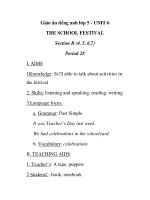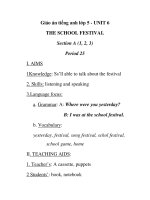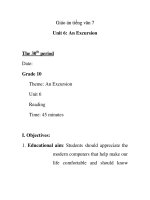Giáo án tiếng anh lớp 8: Unit 6 The young pioneers club pot
Bạn đang xem bản rút gọn của tài liệu. Xem và tải ngay bản đầy đủ của tài liệu tại đây (111.54 KB, 43 trang )
G
G
i
i
á
á
o
o
á
á
n
n
t
t
i
i
ế
ế
n
n
g
g
v
v
ă
ă
n
n
8
8
Unit 6
The young pioneers club
Period 33 lesson 1: Getting started
Listen and read
A / Aims and Objectives : By the end of the lesson ,
Ss will be able to understand the dialogue about the
young pioneers .
B / Teaching aids : Textbook , 5 cards for drill ,
Cassette …
C / Procedure :
I / Warm up
:
Chatting
Ask Ss some questions about
Chatting
their activities and their summer
holidays .
1. What do you often do on your
summer holiday ?
2. Are you members of the
Young Pioneers and Youth
Organization ?
3. Are there any activity
programs for the summer ?
4. Do you take part in them ?
5. What activity do you like most
?
II / Presentation : Introduce the
topic of the lesson and some
new words to Ss .
1. Pre – teach vocabulary :
- to enroll ( translation )
( whole class )
Listen and
repeat in
chorus and
individually ,
then copy .
- Answer application form (
visual )
- Out door activities : Games that
you play in the open air rather
than in a building or a house
such as : football , tennis
- Hobby (n)
- Acting (n)
* Checking : Rub out
and remember
2. Listen and read the dialogue :
- Set the scene “ Nga is a student
in grade eight . She wants to
enroll in the activities for the
summer . “
- Ask Ss to listen and read the
dialogue at the same time .
Play game
Listen to the
tape
Read the
dialogue
Work in pairs
Report their
results in front
of class.
- Get Ss to work in pairs and
complete Nga
,
s particulars .
- Call on some pairs to
demonstrate in front of class.
- Give feedback
* Name : Pham Thi Nga
* Home address : 5 Tran Phu
Street
* Phone number : Not available
* Date of birth : April 22 , 1989
* Sex : Female
* Interest : Drawing , outdoor ,
activities , acting
- Ask Ss some questions :
+ What is her name ?
+ What does she live ?
Answer the
questions
( whole class )
+ When was she born ?
+ What are her hobbies ?
- Call on some Ss to answer the
questions .
3 . Concept checking
- What is after “ likes “ ? ->
drawing
- What is after “ enjoys “ ? ->
acting
- What do you call “ drawing “
and “ acting “ -> gerund
- What is the form of “ gerund “
? -> V- ing
- When do we use “ gerund “ ? -
> after some verbs : like , love ,
enjoy , hate , mind .
* Form Like , love , enjoy ,
Listen and
copy the form
. Then practice
hate + gerund
* Drill : word cue drill
- Prepare 5 cards with these cues
on them :
a. play soccer / volley ball
b. watch TV / listen to music
c. read books / do homework
d. Chat with friends / do the
housework
e. Cook meal / decorate the
house .
=> What are your hobbies ?
I like / love playing soccer
and volleyball .
- Call on Ss to practice asking
and answering
Practice
reading the
dialogue in
pairs .
Work in
groups
- Correct mistakes if any .
- Call on some pairs to practice
the dialogue .
III / Production Survey
- Ask Ss to copy down the chart
and work in groups of three to
ask their friends and tick on the
chart .
Do you
like
name /
Nam
Mai
love
like don
,
t
hate
like
love like
don
,
t
hate like
-
play
soccer
Listen and
copy .
-
washing
up
- cookin
g
meals
-
performing
music
-
gathering
broken
glasses
-
watching
TV
-
play
badminton
- Give feedback by asking Ss to
report their friends
,
hobbies .
IV / Homework :
1. Write about their friend
,
s
hobbies .
2. Prepare the next lesson .
Period 34 Lesson 2 : Speak
A/ Aims and Objectives : By the end of the lesson ,
Ss will be able to ask for favors and respond to
favors, offer and respond to assistance
B / Teaching aids : Cut out shark , cut out girl / boy ,
textbook .
C / Procedure :
I / Warm up : Shark
,
s
attack
-
Cut out a shark and a school girl
/ boy from card
-
Draw some steps , then stick the
Play game
cut out girl / boy on the top of the
steps , the sharks in the sea .
- Draw 5 gaps for the word –
favor
II / Presentation
-
Ask Ss the meanings of the
word FAVOR
+ What do you say to ask for a
favor ?
Can you help me ?
Could you do me a favor ?
Can / Could you ……… ?
+ When do you ask for favor ?
Need some help
+ How do you say to respond to
favor ?
Listen and
practice
asking and
answering the
questions
Listen and
copy
Certainly / Of course / sure
No problem
+ What does the receptionist say
?
May I help you ?
+ What is for ?
For offering assistance
+ another way to offer assistance
?
Do you need any help ? / Let me
help you .
+ How do you say to respond to
assistance ?
Yes . No , thank you .
-
Ask Ss to copy down the
following phrases
Asking for
favor
Responding for
favor
* Can /
Could you
help me
please ?
* Could you
do me a
favor ?
* I need a
favor
* Can /
could you
?
* Certainly / of
course / sure
* No problem
* What can I do
for you ?
* How can I help
you ?
* I am sorry . I am
really busy
Offering Responding to
Repeat
chorally ,
individually
Work in pairs
Work in pairs
assistance assistance
* May I
help you ?
* Do you
need any
help ?
* Let me
help you .
* Yes / No .
Thank you
* Yes . That is
very kind of you .
* No . thank you .
I am fine .
I can manage .
- Ask Ss to repeat chorally and
then individually all the phrases
in the chart .
III / Practice :
1. Ask Ss to work in pairs to
practice the dialogues
- Call on some pairs to practice in
front of class .
Closed pairs
Practice the
dialogues in
front of class
Listen and
- Correct pronunciation if any .
2. Use appropriate phrases to
make similar dialogues about
some of the following situations
with a partner.
- Have Ss work in pairs .
- Call on some pairs to practice in
front of class .
- Give feedback
IV / Production : Situation
: A
receptionist wants to help a
tourist who ne
eds to go to the
nearest bank
Receptionist :
……………………………?
Tourist
: yes . Can you
…………… ?
copy .
Receptionist : Sure . Turn right
when you get out of the
hotel . Turn left at the first corner
.
……… your right .
Tourist :……………………
- Ask Ss to work in pairs to make
the dialogue and move around the
class and help Ss .
-
Call on some Ss to practice the
dialogue in front of the class .
V / Homework :
1. Learn by heart the expressions
to offer assistance and favor and
how to respond them .
2. Write the dialogue between
you and a tourist who lost money
.
* Feedback :
Period 35 lesson 3 : Listen
A/ Aims and Objectives : By the end of the lesson ,
Ss will be able to complete a song for details
B / Teaching aids : text book , cassette , chalk ,
C / Procedure :
I / Warm up : Listen to a song
- Let Ss listen to the song for
fun
II / Pre - listening : Introduce
Listen to a
song
the topic of the listening and
some new words to Ss .
1. Pre – teach vocabulary
- to unite = doan ket , hop nhat ,
ket hop
- peace (n) >< war (n)
2. Guess the missing words
- Ask Ss to guess the words to
fill in the gaps in the song
- Get them to share with their
partners and report their
predictions .Then write them on
the board .
III / While - listening :
- Turn on the tape 3 times and
ask Ss to check their predictions
.
Listen and
copy down
Work in
groups to
guess the
missing words
in the song .
Report their
predictions .
- Call on some Ss to read their
results
- Give feedback
Children of our land unite
Let
,
s sing for peace ,
Let
,
s sing for right .
Let
,
s sing for the love between
north and south ,
Oh, children of our land , unite .
Children of the world hold
hands .
Let
,
s show our love from place
to place .
Let
,
s shout out loud ,
Let
,
s make a stand ,
Oh , children of the world , hold
Listen to the
tape and check
their
predictions
Read their
answers .
Listen and
hands .
-Turn on the tape once more to
check the results again .
IV / Post - listening :
- Ask Ss to work in groups to
learn how to sing the song
+ Ss listen to the tape and repeat
in chorally .
- Call on some Ss from each
groups to sing a song.
V / Homework :
1. Copy down the completed
song .
2. Prepare the next lesson .
check the
results again .
Learn how to
sing
Listen and
copy .
Period 36 lesson 4 : Read
A/ Aims and Objectives : By the end of the lesson ,
Ss will be able to know more about a youth
organization – the Boy Scouts of America ( BSA )
B / Teaching aids : Text book , Poster of T /F
statements
C / Procedure :
I / Warm up :
Jumbled
words
- Write six words whose letters
are in disorder
1. Racchtaer 4. Pexainl
2. Iojn 5 .
Nessmsibuan
3. Mai 6 . Thauolgh
- Ask Ss to work in 2 teams and
call on 6 Ss from h team write the
Work in
teams
right words on the board .
1. Character 2. Join 3.
Aim
4. Explain 5. Businessman 6.
Although
II / Pre- reading : Introduce the
topic of the reading passage and
some new words to Ss .
1. Pre – teach vocabulary :
- to encourage : give the verb
which means to give Sb support
-
Citizenship (n) = quyen cong
dan
- coeducational (a) ( translation )
- Voluntary (a) = tu y , tu nguyen
- to lead – led – led
- to establish = to start / to create
Listen and
copy
Repeat
chorally ,
individually .
Play game
Work in
an organization
* Checking : Slap the
board
2. T /F Statements prediction
-
Stick the poster with the
statements on the blackboard and
guess which is true , which is
false .
a. The Boy Scout of America is a
youth organization
b. Scouting began in America
c. William Boyce is a
businessman in LOndon .
d. Boys and girls can join BSA
e. The Scouting Association is the
biggest voluntary youth
organization in the world .
groups to
predict .
Report their
predictions
Listen to the
tape and read
the passage to
check their
- Call on Ss to report their
predictions and write them on the
board
III / While - reading :
1. Reading :
- Turn on the tape and ask Ss to
look at their books at the same
time to read the passage to check
their predictions
- Call on some Ss to read their
results aloud and give feedback :
a. T b. F c. F d. F
e. T
- Have them correct false
statements .
b. Scout began in England
c. William Boysce is an American
predictions
Read their
results .
Correct the
false
statements
Read the
passage aloud
.
Work in pairs
to do the
business man .
d. BSA is mainly for boys .
- Call on some Ss
to read the
passage aloud .
- Correct mistakes if any .
2. Fill in the missing dates
- Ask Ss to work in pairs to do
exercise 1 / 57
- Call on some pairs to
demonstrate in front of class
-
Give feedback :a.1907 b. 1909
c. 1910 d. 1994
3. Answer :
- Have Ss work in pairs to
practice asking answering the
questions .
- Call on some pairs to practice
exercise
Work in pairs
to practice
asking and
answering the
questions .
Work in open
in front of the class
- Give feedback
a. Scouting began in England in
1907
b. The meeting between a boy
scout and Mr William Boyce led
the Scouts Asso
ciation crossing
the Atlantic in 1910 .
c. Girls can join in the Girls
Guides Association and Camp
Fire Boys and girls .
d. They are building characters ,
good citizenship and personal
fitness .
IV / Post - reading
: Interview a
member of the Boys Scouts
of
American
pairs









